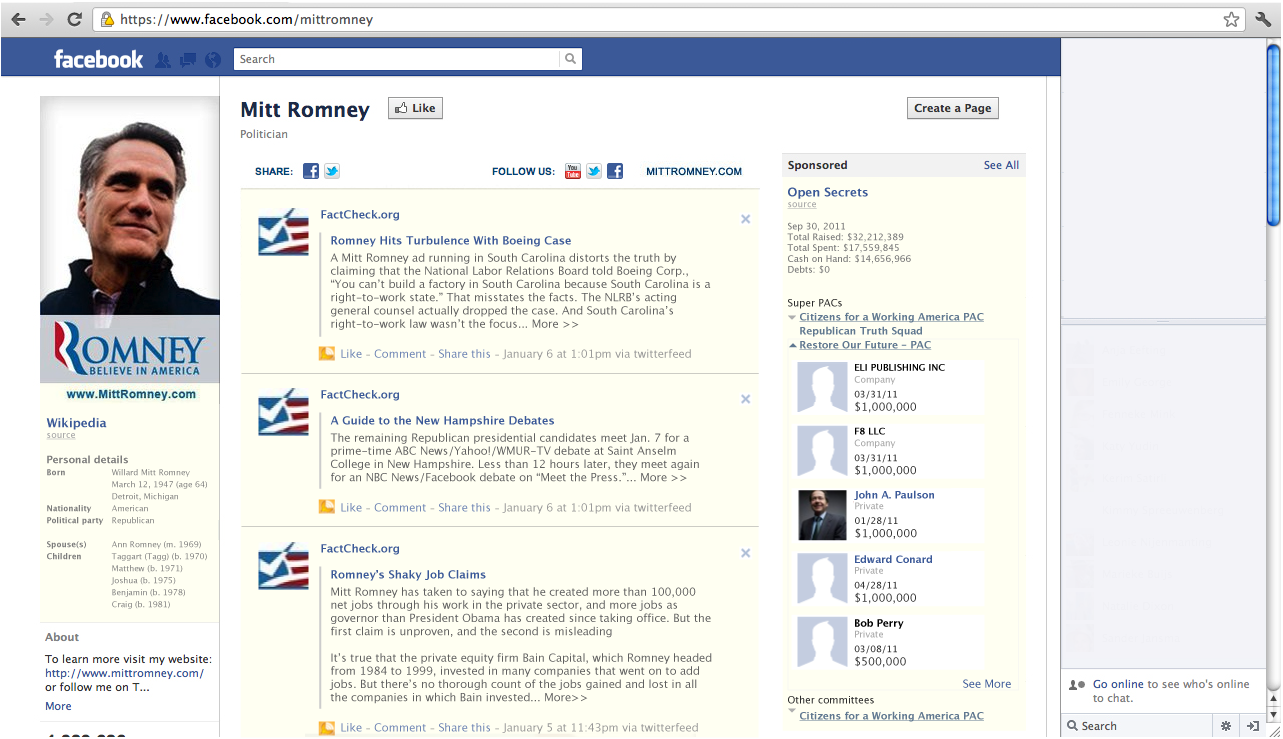You are here: Foswiki>Dmi Web>DmiWinterSchool2012DefacingFacebook (21 Feb 2012, Marije)Edit Attach
Defacing Facebook
Team Members
Federica Amistani, Marije Rooze, Samuel TettnerIntroduction
57.1% of US Internet users are on Facebook; in 2010, Facebook grew by 7.9 users/second; In August 2010, U.S. Internet users spent 41.1 billion minutes on Facebook, surpassing Google Inc.’s 39.8 billion minutes for the first time (source: social commerce today). Facebook’s version of reality can be characterized as un-realistic, portraying an all open-world where everyone shares information happily and willingly. Eg., One can have friends but no enemies, one can like posts but not dislike them. Facebook does not only engage with the social through this framework, but ventures into the political through “pages”, issues, campaigns and groups. This uncritical perspective, which in a way is “cleaned up” from the messy, complex and at times corrupt reality of politics can be dangerous. If people use Facebook to relate to politicians and political movements, a more critical and realistic portrayal of information is needed. This project seeks to “deface” Facebook of its cleaned up and naïve façade by re-introducing the connection between money and politics. We chose to focus on this issue particularly as different activities such as campaign finances, lobbying, advocacy group contributions and Political Action Committee influences have a direct and tangible effect on national politics – effect which is often under-represented.This project aims to contextualize political opinions within a complex eco-system of money and power by making these covered money-politics links more available, interactive and easy to understand for the Facebook user.
Research questions
- How can Facebook be modified to portray a more realistic and grounded view of politics?
- What sort of information can be used to compliment what is already there on Facebooks “pages” ?
- Which information is already collected, and how – which is useful to portray on a politican’s Facebooks page?
Methodology
We are proposing to create a add on which will activate the real Facebook. The add-on will integrate several APIs that will reconfigurate the Facebook page.APIs and source sites
- Opensecrets.org: “the most comprehensive resource for federal campaign contributions, lobbying data and analysis available anywhere”
- Factcheck.org: “a nonpartisan, nonprofit “consumer advocate” for voters that aims to reduce the level of deception and confusion in U.S. politics” by monitoring “the factual accuracy of what is said by major U.S. political players in the form of TV ads, debates, speeches, interviews and news releases”
- campaignmoney.com
- politifact.com
- Wikipedia’s infobox
Sections
Top friends
Shows a list of the 10 people who have given the most money to his campaign.Data collected from:
Heard around the grapevine
A section were common online forms of misconceptions (like chain-mails) about the candidate get cleared.Data collected from
“likes”
Similar to the already-existing interface which allows users to “like” causes or organizations, this section shows the topic areas, organizations, or industries which fund the candidate’s campaign, and therefore he “likes”. Can be organized by: issue, organization, industry, political leaning etc Data collected from:Truth-o-meter
Ranks politicians statements in five categories: Pants on fire – mostly false – half true- mostly true- true.Data collected from:
Mock-up version
We used the Facebook page of Mitt Romney as example, the information in the mock-up were collected from the previous mentioned websites on January 27, 2012.

Further steps
- Find out other informational gaps that are worth to be filled
- Find out new/more data to fill the gaps in
- Differentiate the information needed and the informational sources by country
- Create the real «deFaced» Profile
| I | Attachment | Action | Size | Date | Who | Comment |
|---|---|---|---|---|---|---|
| |
MittRomney_official_V0_06.png | manage | 344 K | 27 Jan 2012 - 16:44 | Main.Marije | |
| |
addon_example_v3.jpg | manage | 377 K | 27 Jan 2012 - 16:52 | Main.Marije |
Edit | Attach | Print version | History: r2 < r1 | Backlinks | View wiki text | Edit wiki text | More topic actions
Topic revision: r2 - 21 Feb 2012, Marije
 Copyright © by the contributing authors. All material on this collaboration platform is the property of the contributing authors.
Copyright © by the contributing authors. All material on this collaboration platform is the property of the contributing authors. Ideas, requests, problems regarding Foswiki? Send feedback


